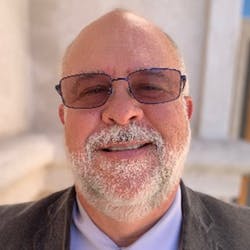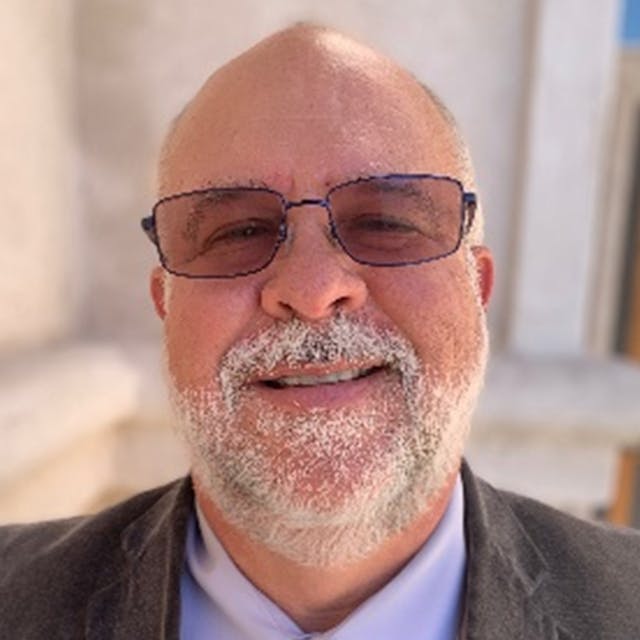Answering The Call
5 min read

Navigating Financial Stress in Ministry

by Ken Colman
Bridge Pastor, Dungeness Valley Lutheran Church, Sequim, WA
The Rev. Kenneth Colman, Bridge Pastor for Dungeness Valley Lutheran Church, Sequim, Washington, discusses the emotional challenges that come with financial stress, and how the Ministers’ Financial Vitality Initiative (MFVI) helped him address and manage his debt.
Within the last 10 years, I have served mostly smaller churches where I have earned smaller salaries, and have become increasingly aware of my need to plan for retirement. So, when I got an email from the Pension Boards about MFVI, I knew it would be a great program to better understand money. The truth is, in seminary, they don’t really teach us about money. I was just telling my wife that I wish we had this program back when we signed up for the Pension Boards in 1990. Since becoming an MFVI participant two years ago, I’ve used the incentive grant to pay off our credit cards at a lower rate, and we’ve cut our credit card debt in half.
“Since becoming an MFVI participant two years ago, I’ve used the incentive grant to pay off our credit cards at a lower rate, and we’ve cut our credit card debt in half.”
The Financial Limits of Serving Part-Time
Not serving full-time has made me constantly think about when I can retire. I’ll be 64 years old soon, so that’s my biggest question. What makes this more difficult is that I’ve seen churches struggle to pay their pastors. I’ve always been in small churches that, unfortunately, haven’t given me the raises I’d like to see. My pension is not where it could have been if I had worked with larger churches that paid better.
“Not serving full-time has made me constantly think about when I can retire.”
I expected to retire from my last church in San Diego, but two and a half years in, the church cut my salary. At five years in, they cut my salary 50 percent. Well, how do you live in California with no health insurance and a 50 percent salary? So, I started looking for a full-time call; unfortunately, at my age, this is difficult to find.
Currently, I’m only supposed to work 20 hours a week, so I track the time to ensure I never go over 25 hours. Soon, I’ll be working closer to 30-35 hours. I negotiated for this, and that’s how I’ve been taking care of myself. I’m learning to set my boundaries. MFVI has also helped me to talk about money much more easily.
Looking back at the salaries I made in the nineties; I would be in a different place if I had MFVI back then. I would have a better understanding of discussions surrounding money and dealing with debt. I encourage other clergy struggling with debt to see if they are eligible to participate in MFVI.
Throughout my ministry, there have been times when I couldn’t afford to do the things that my colleagues could afford, often because their partners and spouses make good salaries. My wife and I were struggling. Now that my wife has a new job, and I have a decent part-time job, I’m also a substitute teacher in the school district—we make a little extra money.
Before I got my bridge pastorate, I was incredibly stressed. My wife lost her job a month after I lost mine, so neither of us had any healthcare. She signed us up for Apple Health—the program that President Obama started in Washington—and a week later I ended up in the hospital for eight days. I think the stress around how we would pay our bills added to what caused my health issues.

Looking After Yourself
Thankfully, I found therapy an important part of self-care. When I was at the Renton Church for 17 years, I was fortunate to join a support group for male clergy led by a therapist. I did a three-week silent retreat, which encouraged me to do more therapy and support work. I soon found myself needing time alone that I never used to ask for.
Ministers’ Financial Vitality Initiative
The Ministers’ Financial Vitality Initiative (MFVI) program helps UCC ministers manage their finances and strengthen financial literacy so they can focus on their ministry. MFVI improves personal finance skills through educational resources, tools, and cash incentives, which help alleviate debt so they can live a financially vital future. Applications for this three-year program are reviewed annually in the fall.

by The Rev. Ken Colman
The Rev. Ken Colman currently serves as Bridge Pastor for Dungeness Valley Lutheran Church, Sequim, Washington, and is a participant in the Pension Boards' Ministers' Financial Vitality Initiative. Rev. Colman was ordained in the Central Pacific Conference in 1990. Born in Iran, Rev. Colman lived in several Asian countries including Nepal, Thailand, and Laos; and he graduated from high school in Afghanistan. He moved to the U.S. in 1978, and attended Oregon State University in Corvallis, Oregon, and First Congregational, UCC, where he felt the call to go into ministry. Rev. Colman has served several churches in Weeping Water, NE, Omaha, NE, Colorado Springs, CO, Renton, WA, Alpine, CA, and Bremerton, WA.
Very often, if we’re not careful, we don’t know how to go about asking for help to get the support we need, and that is especially true for ministers. Ask for help!Veronica Kyle
Member of Covenant United Church of Christ, South Holland, IL
RELATED ARTICLES
Financially Transformed and Empowered
Coming to Terms with Financial Practicalities
POPULAR RESOURCES
Securing Your Foundation for the Ministry of Others
Changes in your ministry role, unexpected life events, or other personal challenges can impact your financial wellbeing and retirement plans. Secure your financial foundation.
